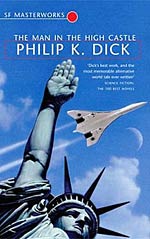
![]() charlesdee
charlesdee
7/31/2011
![]()
I've never been big on Alternative History novels. Never been tempted by those Harry Turtledove books that show spacecraft flying Confederate flags or Doughboys crouching behind armor-plated dinosaurs. But this is Dickian alternative history, and the novel that won him the Hugo award. He claims in a letter from the mid-sixties that he was not that crazy about this book. Maybe like Henry James he craved success but then tended to look down on works that brought him the most attention. In James' case it was Washington Square, Daisy Miller, and The Turn of the Screw. And that is the only comparison I would ever think to make between Philip K. Dick and Henry James.
The Allies have lost WWII. The United States is now officially only those states on the Eastern seaboard, and they are under Reich Rule. No one has shown much interest in the Midwest, and, although still part of a conquered empire, it exists as a marginally freer buffer zone. The Japanese control the Pacific States of America, and the bulk of the novel takes place in San Francisco. In the PSA, most Americans have made their peace with the Japanese occupation. No Patrick Swayze has risen to the fore and led a group of teenagers, strangely proficient in advanced military weaponry, to stage a Red Dawn style insurgency. Most San Franciscans are working profitably with or for the Japanese, but in alliances that are marked with crippling levels of anxiety. This is, after all, a Philip K. Dick novel.
Dick establishes a dozen or so characters, several of whom are even who they claim to be, and sets things rolling so that paths seemed destined to cross in disastrous ways. But in fact things run rather smoothly with the exception of a couple of spectacular outbreaks of violence. This is a novel of anxiety, not action. It's a story where anxiety can arise from the excruciating decision of what will be the proper gift to "graft" in a given situation, or by the discovery that the Nazi's are planning a massive nuclear holocaust. Linked characters are scattered across the continent, and I was worried that somehow everything was going to tie together neatly as in one of the machines-for-winning-Academy-Awards like Crash. But the stories run parallel more often than they cross. One character does save another's life, but he never meets the man and acts because he is pissed off and wants to exert some authority.
And then there is the man in the high castle, the reclusive author Hawthorn Abendsen --how does Dick think up these names. Abendsen is the author of the controversial and absurdly titled novel The Grasshoper Lies Heavy. This is an alternative history in which the allies win the war, and although banned by the Nazis, Japanese and American readers are snatching it up. The final question in Dick's novel centers on the possibility that Abendsen's novel is not fiction. The Allies did win the war. History is not a progression of events but an infinite play of possibilities. But still a play where some people get killed,some go insane, and some plan to blow the whole thing up.
http://www.potatoweather.blogspot.com